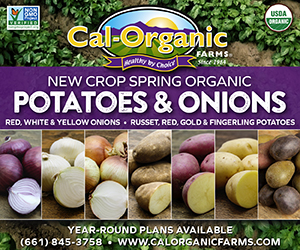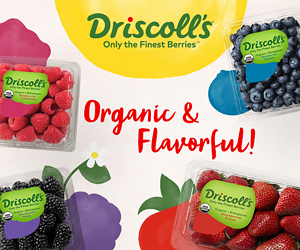Source: Sustainable Food News
New European Union (EU) rules requiring electronic export certificates (Certificate of Inspections or eCOI) only for imported organic products goes into effect Oct. 19.
The new rules are aimed at improving the traceability of organic products in an effort to enhance food safety provisions and reduce potential fraud involving organics.
Following the outbreak in Europe of classic swine fever in 1997, the EU sought to improve the traceability of animal movements within the single market by introducing an online veterinary system known as Trade Control & Expert System (TRACES), which became compulsory for all 28 member states in 2005.
The EU has now updated the TRACES system to include the digitization of certification documents for organic products from the United States, and other countries, imported to EU member countries.
It's been nearly five years since the the European Union (EU) signed an organic equivalency arrangement with the USDA's National Organic Program (NOP), streamlining trade between the world's two largest organic markets. The EU market for organic products was worth $35 billion, according to the 2016 World of Organic Agriculture.
Under the current organic equivalency arrangement between the United States and the EU, certified operations must ship organic products with an EU certificate of inspection, completed by a USDA-accredited certifier.
The new organic export requirements under the TRACES system became effective April 19, with a six-month period to comply, during which time paper and electronic certificates of inspection will co-exist in the marketplace.
The organic export requirements under the TRACES system will become fully electronic starting Oct. 19, after which time organic imports will be covered only by e-certification.
To help certifiers and other authorities comply with the new requirement, the EU has provided instructions and plans to conduct training. Check out the TRACES toolkit and the video below for more information.
CCOF Certification Services LLC, a Santa Cruz, Calif.-based, USDA-accredited organic certification agency, representing more than 4,400 certified organic members in 44 states and three countries, said its members need to prepare for the change by following four steps:
- EU-based importers must register with the EU and then as an operator with TRACES. "They should work with their certifier to achieve this," CCOF said.
- EU-based importers are responsible for entering your product and shipment details and requesting the eCOI. CCOF said it will receive these requests through TRACES.
- CCOF members must continue to submit the EU Export Certificate Request Packet to export@ccof.org. This will allow CCOF to verify the details submitted by the EU-based importer.
- For the foreseeable future, a physical COI will also need to be sent with the shipment, or directly to the importer. The EU is working to implement fully electronic certificates in the future.
Check out CCOF's exporter guidance webpage for details and contact export@ccof.org for further information. Once you know you will be shipping to an EU member state, complete these fillable PDF forms and send the entire PDF packet to export@ccof.org.
For operations shipping from the United States, enrollment in CCOF's Global Market Access Program for US/EU Equivalency is required. For operations shipping from Mexico, enrollment in CCOF's International Standard Program is required.






